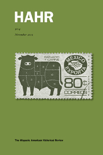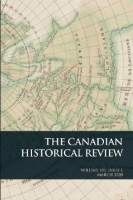
HAHR-Hispanic American Historical Review
Scope & Guideline
Illuminating the Past, Shaping the Future of Hispanic Studies
Introduction
Aims and Scopes
- Interdisciplinary Historical Analysis:
HAHR emphasizes an interdisciplinary approach, integrating perspectives from history, anthropology, sociology, and cultural studies to provide a comprehensive understanding of Latin American and Caribbean histories. - Focus on Marginalized Voices:
The journal prioritizes research that highlights the experiences and contributions of marginalized groups, including Indigenous peoples, Afro-Latinos, and women, thereby enriching the historical narrative of the region. - Transnational and Comparative Studies:
HAHR encourages studies that transcend national boundaries, examining transnational movements, diasporas, and comparative histories that reveal the interconnectedness of Latin American experiences with global events. - Critical Engagement with Colonial and Postcolonial Histories:
The journal critically engages with colonial legacies and the ongoing impacts of colonialism in contemporary Latin America, fostering discussions on race, identity, and power dynamics. - Exploration of Social Movements and Political Change:
HAHR features research on social movements, revolutions, and political transformations, exploring how these events shape societal structures and cultural identities.
Trending and Emerging
- Environmental Histories and Ecological Perspectives:
Recent publications increasingly address environmental issues and the historical interactions between humans and their environments, reflecting a growing awareness of ecological challenges in Latin America. - Indigenous Rights and Histories:
There is a marked increase in research focusing on Indigenous rights, histories, and contemporary movements, signaling a recognition of the importance of Indigenous perspectives in understanding Latin American history. - Health and Medicine Studies:
The journal has expanded its scope to include the histories of health, medicine, and public health crises, particularly in the context of the COVID-19 pandemic and its socio-political implications. - Cultural Production and Identity:
Emerging themes include the study of cultural production—such as music, literature, and visual arts—and their roles in shaping national and regional identities, especially in the context of globalization. - Digital Humanities and Archives:
HAHR is increasingly engaging with digital humanities, exploring how digital tools and methodologies can enhance historical research and access to archives, reflecting broader trends in academia.
Declining or Waning
- Traditional Military History:
There is a noticeable decrease in publications focused solely on traditional military history, as the journal increasingly prioritizes social and cultural histories that examine the impacts of military actions on civilian populations. - Eurocentric Perspectives:
Research that centers exclusively on European viewpoints or narratives regarding Latin America is becoming less prevalent, as scholars push for more locally grounded perspectives that reflect the voices of Latin American peoples. - Static National Histories:
The focus on static national histories is waning in favor of more dynamic, transnational approaches that consider the interconnectedness of Latin American nations and their relationships with each other and the world.
Similar Journals

NEW MEXICO HISTORICAL REVIEW
Charting the Course of New Mexico's Historical ScholarshipWelcome to the New Mexico Historical Review, a premier scholarly journal dedicated to advancing the study of history within the cultural context of New Mexico and beyond. Published by the University of New Mexico, this journal features a wide array of peer-reviewed articles that explore historical narratives, regional studies, and interdisciplinary research in the field of history. With a commitment to scholarly excellence, the journal contributes significantly to the historical dialogue, reflected in its Scopus ranking within the 20th percentile among peers in the Arts and Humanities category. Although it currently does not offer Open Access options, the New Mexico Historical Review aims to engage researchers, professionals, and students alike by providing a platform for critical discourse and innovative perspectives on historical themes. Explore its rich history of publication, with a continuous release since the late 1970s, and discover how it has shaped the understanding of the intricate tapestry of New Mexico's past.

Camino Real-Estudios de las Hispanidades Norteamericanas
Charting New Paths in the Study of North American HispanidadesCamino Real-Estudios de las Hispanidades Norteamericanas is an esteemed journal published by the Universidad de Alcalá, Instituto Franklin de Investigación Norteamericanos, focusing on the interdisciplinary study of North American Hispanic studies. With a dedicated mission to advance scholarship in this emerging field, the journal serves as a crucial platform for researchers, academics, and students interested in exploring the cultural, historical, and social dynamics of Hispanic populations in North America. While the journal does not currently operate under an Open Access model, it is committed to rigorous peer review and upholding academic standards that are essential for quality research dissemination. Situated in Alcalá de Henares, Spain, this journal not only contributes to the understanding of Hispanic influences in North American contexts but also strengthens the dialogue between diverse scholarly communities, making it a valuable resource for anyone engaged in this vital area of study.

PACIFIC HISTORICAL REVIEW
Navigating the Complexities of Pacific Cultural HeritagePACIFIC HISTORICAL REVIEW, published by the University of California Press, serves as a pivotal academic journal in the field of History. With a robust ISSN of 0030-8684, this journal has been dedicated to examining the intricate narratives and themes of the Pacific region since its inception in 1967. Recognized for its scholarly contributions, it holds a commendable Q3 ranking in the History category for 2023 and is positioned in the 58th percentile among its peers in the Scopus database. The journal offers a platform for rigorous research and interdisciplinary dialogue, aiming to illuminate the diverse historical experiences and cultural complexities of the Pacific. While it does not provide open access, it remains an esteemed publication for researchers, professionals, and students seeking in-depth analyses and scholarly discourse in the rich tapestry of Pacific history.

CANADIAN HISTORICAL REVIEW
Fostering Critical Discourse in History and Religion.The Canadian Historical Review serves as a premier scholarly journal dedicated to fostering research and discourse in the fields of history and religious studies, published by the esteemed University of Toronto Press. With an ISSN of 0008-3755 and an E-ISSN of 1710-1093, this journal has been a vital contributor to the academic landscape since its inception, continuing to provide a platform for innovative research and critical analysis from 1978 to the present. Recognized in the Q2 category for both History and Religious Studies in 2023, it ranks in the top tier of its field, positioning itself as an essential resource for scholars eager to explore diverse topics in Canadian history and beyond. While the journal does not currently operate under an Open Access model, it remains highly regarded for its rigorous peer-review process, ensuring the highest standards of academic integrity. The editorial board is committed to expanding the boundaries of historical inquiry, making it a cornerstone for researchers, professionals, and students alike who seek to deepen their understanding of the past.

LATIN AMERICAN RESEARCH REVIEW
Celebrating the vibrant cultures and histories of Latin America.LATIN AMERICAN RESEARCH REVIEW, published by Cambridge University Press, is a premier open-access journal dedicated to advancing scholarship in the field of Latin American studies. Established in 1970, the journal has consistently evolved to address critical interdisciplinary issues, encompassing a broad spectrum of topics from anthropology and cultural studies to economics and political science. With its strong impact reflected in 2023's quartile rankings, including Q1 in both Cultural Studies and History, LATIN AMERICAN RESEARCH REVIEW ranks among the top-tier journals in multiple disciplines, capturing the interest of scholars worldwide. This journal not only fosters a deeper understanding of Latin America's diverse cultures, histories, and socioeconomic landscapes but also serves as a vital platform for innovative research and discussions. By offering open access since 2017, it ensures that its valuable contributions are widely disseminated, making it an indispensable resource for researchers, professionals, and students alike who are looking to engage with contemporary Latin American issues.

Revista Brasileira de Historia
Unveiling the Past, Shaping the FutureRevista Brasileira de Historia, published by the ASSOC NAC HISTORIA-ANPUH, stands as a pivotal platform for the dissemination of historical scholarship within the Brazilian context and beyond. With an open access policy since 1997, this journal welcomes contributions that enhance understanding in various intersecting fields, such as Cultural Studies, Geography, and Sociology. The journal is recognized for its quality, evidenced by its ranking in established academic quartiles, including Q2 in History, making it a significant resource for historians and social scientists alike. Covering a span of converged years from 1999, 2001, and 2007 to 2024, Revista Brasileira de Historia enriches the scholarly dialogue by providing accessible research that fosters critical engagement with Brazil's historical narratives. Researchers, professionals, and students interested in the dynamic interactions between history and society will find this journal an indispensable resource.

AMERICAN JEWISH HISTORY
Advancing Scholarship on the Jewish American ExperienceAMERICAN JEWISH HISTORY is a premier academic journal published by Johns Hopkins University Press, dedicated to the exploration and analysis of the Jewish experience in the American context. With ISSN 0164-0178 and E-ISSN 1086-3141, this journal serves as a vital resource for scholars and students in the fields of cultural studies, history, and religious studies, as evidenced by its placement in the Q3 quartile across these disciplines in 2023. Reaching a broad audience interested in the historical, social, and cultural dimensions of the American Jewish narrative, the journal has converged in various years, ensuring a robust collection of multidisciplinary research and discussions. Although it operates under a traditional subscription model, the journal remains an essential platform for critical analysis, fostering deeper understanding of Jewish identity and history. With Scopus rankings placing it at the 60th percentile in History and 62nd percentile in Religious Studies, AMERICAN JEWISH HISTORY stands as a respected publication that significantly contributes to the discourse surrounding Jewish history and culture in the United States.

CHASQUI-REVISTA DE LITERATURA LATINOAMERICANA
Cultivating Critical Perspectives on Cultural ExpressionsCHASQUI-REVISTA DE LITERATURA LATINOAMERICANA is an esteemed academic journal published by Arizona State University, dedicated to the exploration and dissemination of research in the fields of Literature and Literary Theory and Cultural Studies. With an ISSN of 0145-8973 and an E-ISSN of 2327-4247, the journal serves as a critical platform for scholars examining the complexities of Latin American literature from diverse perspectives. Notably ranked in the second quartile in its field as of 2023, CHASQUI reflects its commitment to quality and impactful scholarship. The journal operates within a two-year converged publication cycle, ensuring it remains at the forefront of contemporary discussions and innovations in its disciplines. Although there are no open access options, researchers and students alike will find valuable insights within its pages, bolstered by a robust academic community. Through its dedication to fostering literary scholarship, CHASQUI plays an integral role in advancing the understanding of Latin American narratives and cultural expressions.

E-Latina-Revista Electronica de Estudios Latinoamericanos
Exploring Latin America's Rich Tapestry of Culture and SocietyE-Latina-Revista Electronica de Estudios Latinoamericanos is a premier open-access journal dedicated to the interdisciplinary study of Latin American culture, society, and politics. Published by the Facultad de Ciencias Sociales at the Universidad de Buenos Aires, this journal aims to provide a platform for the dissemination of high-quality research, facilitating an exchange of ideas among scholars, practitioners, and students alike since its inception in 2013. With its commitment to accessibility, E-Latina makes significant contributions to the understanding of contemporary Latin American issues, inviting contributions from a diverse range of academic fields. Its open-access model not only enhances readership but also ensures that vital knowledge reaches a global audience, thereby promoting scholarly dialogue and collaboration. Researchers interested in the dynamic and evolving landscape of Latin America will find a wealth of research and insights that reflect the complexities of the region in this esteemed publication.

Historia-Santiago
Exploring Latin America's Rich Tapestry of HistoryHistoria-Santiago is an esteemed academic journal published by the Pontificia Universidad Católica de Chile, Instituto de Historia. Since its inception in 2000, the journal has embraced an Open Access model, facilitating broad dissemination of historical research and ensuring that critical scholarly work is freely accessible to researchers, professionals, and students around the globe. With a focus on Latin American history, Historia-Santiago provides a platform for innovative research and contributions that engage with diverse historical narratives and methodologies. The journal aims to foster interdisciplinary dialogue and stimulate scholarly debate, thereby enriching the understanding of historical contexts and their implications in contemporary society. By maintaining high academic standards, Historia-Santiago occupies a vital role in the field of historical studies, encouraging authors to explore new ideas and perspectives that shape the understanding of our past.